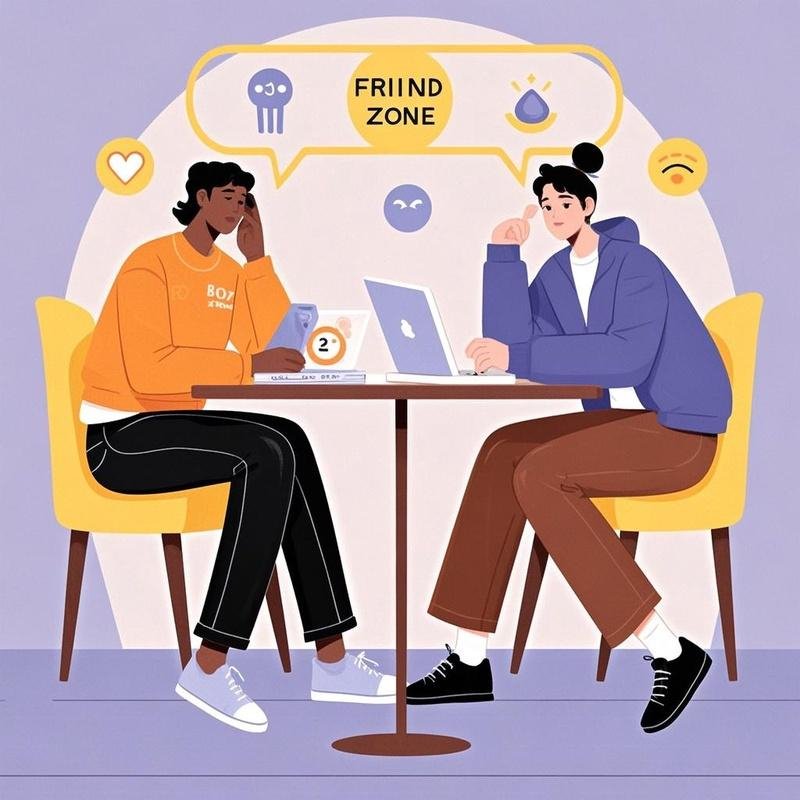
In modern relationships, few concepts are as widely discussed as the friend zone. While it’s often portrayed humorously in media, the reality can be emotionally complex. This article explores the friend zone meaning, its origins, and how to handle unreciprocated feelings with emotional intelligence and respect.
What Is the Friend Zone?
The term “friend zone” describes a situation where one person has romantic or sexual feelings for another, but those feelings are not reciprocated. Instead, the other person sees them purely as a friend.
According to the Merriam-Webster Dictionary, the friend zone is “a state of friendship in which one’s romantic or sexual interest in someone is not reciprocated.“
Origins of the Friend Zone
The concept gained widespread popularity in the 1990s, particularly from the sitcom Friends. In one episode, Joey famously tells Ross that he’s the “mayor of the friend zone” regarding his feelings for Rachel. Since then, the term has become embedded in popular culture, representing the struggles of unrequited love.
Learn More: The Psychology of Unrequited Love – Psychology Today
The Dynamics of the Friend Zone
Understanding friend zone dynamics involves examining the emotions and behaviors of both parties.
1. Emotional Investment
The person in the friend zone often invests emotionally, hoping the friendship will evolve into something more. This can lead to frustration and disappointment when those feelings aren’t returned.
2. Communication Barriers
Miscommunication is common. One person may believe they’re dropping hints about their feelings, while the other remains unaware. Honest conversations are often avoided, leading to unresolved tension.
3. Social Norms and Expectations
Cultural norms can influence these dynamics. For instance, traditional gender roles often expect men to initiate romantic interest, increasing the likelihood of being “friend-zoned” if signals are misread.

How to Navigate the Friend Zone
Being in the friend zone isn’t a dead end. Here’s how to handle it gracefully:
✅ 1. Open Communication
Address your feelings directly. A simple, honest conversation like, “I value our friendship, but I also have feelings for you,” can bring clarity and reduce emotional tension.
✅ 2. Reevaluate Expectations
Accept that not every friendship will turn romantic. Understanding this helps you maintain healthy boundaries without resentment.
✅ 3. Focus on Self-Improvement
Shift your focus to personal growth. Engage in hobbies, build new connections, and boost your confidence outside the friendship dynamic.
✅ 4. Set Healthy Boundaries
If unreciprocated feelings are too painful, create space. This doesn’t mean ending the friendship entirely, but setting boundaries to protect your emotional well-being.
📺 Watch: How to Get Out of the Friend Zone – YouTube
Is the Friend Zone a Bad Thing?
Contrary to popular belief, being in the friend zone isn’t inherently negative. Friendships are valuable, and not all connections need to be romantic to be meaningful.
However, issues arise when:
- Unspoken expectations create resentment.
- One person feels entitled to romance because of their kindness or friendship.
- The friendship becomes emotionally draining due to unbalanced feelings.
Controversies Around the Friend Zone Concept
The friend zone concept has faced criticism, particularly from feminist perspectives. Critics argue that it can imply:
- Entitlement: Suggesting that being “nice” deserves romantic rewards.
- Gender Stereotyping: Reinforcing harmful stereotypes about men and women’s roles in relationships.
- Emotional Manipulation: Using friendship as a strategy with hidden romantic agendas.
Further Reading: The Problem with the Friend Zone – The Guardian
How to Avoid Being Friend-Zoned
While there’s no foolproof method to prevent being friend-zoned, these tips can help:
- Express Interest Early: Don’t wait too long to show romantic interest.
- Confidence Matters: Approach relationships with self-assurance.
- Avoid “Nice Guy” Syndrome: Be genuine in your interactions without expecting something in return.
- Look for Mutual Signals: Pay attention to body language and emotional reciprocity.
When Should You Move On?
If your feelings aren’t reciprocated despite honest communication, it might be time to move on. Signs include:
- Constant emotional distress over the situation.
- Feeling used or undervalued in the friendship.
- Inability to form new connections because of lingering feelings.
Key Takeaways: Navigating the Friend Zone with Grace
- Friend Zone Meaning: A situation where romantic interest isn’t mutual.
- Healthy Approach: Open communication, emotional boundaries, and self-growth.
- Avoiding Entitlement: Kindness doesn’t guarantee romance—respect for autonomy is key.
- Value of Friendship: Sometimes, a strong platonic bond is just as meaningful as a romantic one.
Conclusion: Respect, Growth, and Moving Forward
Understanding the friend zone meaning helps navigate relationships with emotional maturity. Whether you choose to express your feelings, maintain the friendship, or move on, remember that mutual respect and clear communication are the foundations of any healthy connection.
Call-to-Action
Have you experienced the friend zone? Share your thoughts in the comments below. If you found this article helpful, explore our blog for more relationship insights and personal growth tips.